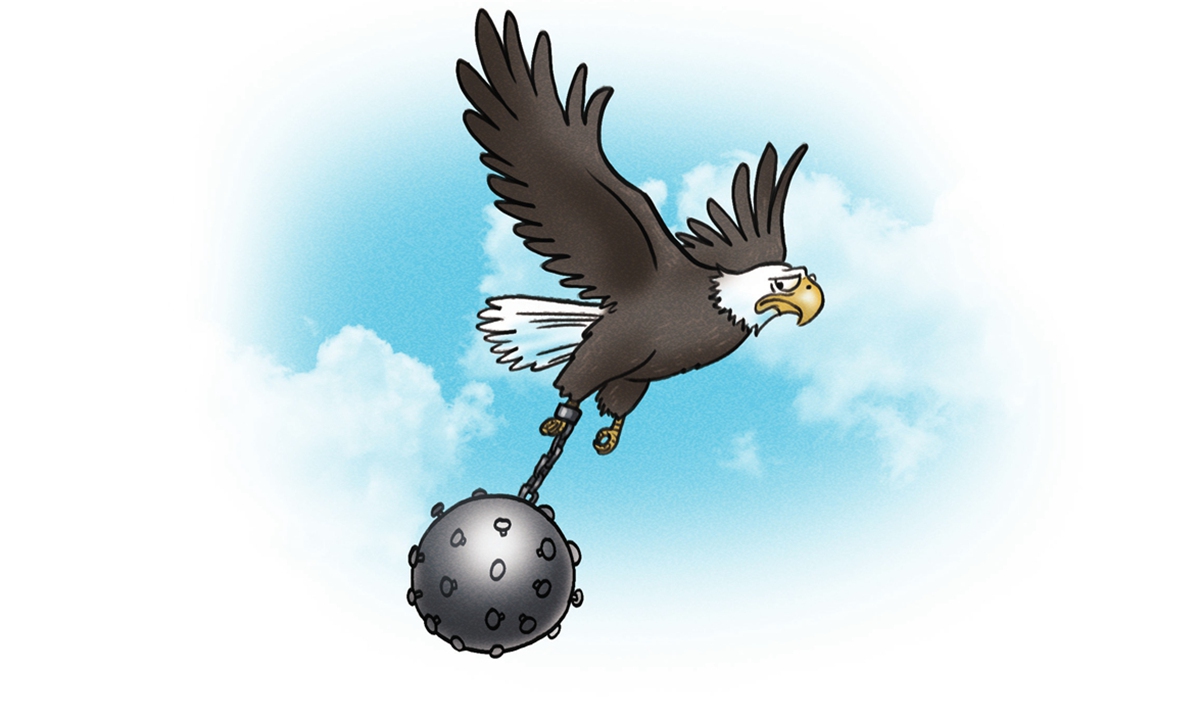
Illustration: Liu Rui/GT
American power in the Western Pacific is eroding. This is the consensus of many strategists from the US and the West.
For example, retired US diplomat Chas W. Freeman, Jr. wrote in the East Asia Forum that, "Washington is playing a losing game with China." He believes US policies toward China, including launching a trade war, trying to cripple China with an escalating campaign of "maximum pressure" and "seeking to contain it" militarily will prove to be self-defeating.
Coincidently, Australian strategist Hugh White opined that the US is in danger of losing the contest over military supremacy over China; it can no longer expect a swift and cheap victory in a war with China in the Western Pacific.
In the mind of Westerners, China is in the Western Pacific to grab regional dominance, leading to vicissitudes in East Asian waters. To analyze the situation in the Western Pacific, it is worth pointing out first that what China competes for is its legitimate right to safeguard its core national interests and to fairly participate in regional and global affairs. This is different from the dominance and advantages in regional affairs that Washington is trying hard to maintain.
From the Western perspective, the foundation of the dominance in regional affairs is power - especially hard power. And the core of hard power is military strength. Washington's military ambitions in the Western Pacific seek to maintain regional hegemony and primacy, and at the same time woo its allies to cope with the so-called threats from countries such as China and Russia. Washington hopes that its military deterrence will force countries that have the potential to replace its position on the high seas, such as China, to step back from taking actions that could jeopardize US interests. This includes competing for regional dominance and threatening the security of US allies.
A losing scenario for the US in the Western Pacific means that it will become increasingly impossible for the US to claim what it wants - at least at a cost it is willing to pay. If the US still wants to militarily win over China, it must pay for unbearable and unimaginable costs. The consequence will be something the US is not willing to see. China's strength is growing, manifested by its determination to safeguard sovereignty and territorial integrity and the acceleration of capability of its nuclear and conventional weapons. This makes the military strength of the US and its expected goals unmatched.
This has already prompted a rethink of US strategy in the Western Pacific among US experts. In January, US scholar Michael Swaine, among others, wrote a report for the Quincy Institute for Responsible Statecraft entitled, "Toward an Inclusive & Balanced Regional Order: A New U.S. Strategy in East Asia." One of the suggestions they made was a more defensive, denial-based (not control- or primacy-based) US and allied force posture in the Western Pacific.
Admittedly, there is still a big gap between China and the US in terms of their military strength as for the number of nuclear arsenals, the long-distance striking capability of conventional weapons, and the quality and quantity of aircraft carrier combat groups. But the US, which deploys its military at the global level, is unlikely to deploy all its combat groups or strategic bombers to the Western Pacific.
China, on the other hand, focuses on its peripheral areas, especially its eastern coast. Once a war between the US and China occurs in the Western Pacific, Washington will have to engage in long-range operations and deployments. Even if it has a number of allies and bases in the region, the US may find it hard to engage for long. Meanwhile, neither side will easily make big concessions or compromises with the other. From this perspective, China and the US will keep a somewhat balanced posture. Both Beijing and Washington will try to avoid a head-on military clash.
Willingly or not, Washington has to admit to a balance of power. The rise of China will inevitably lead to a re-balancing of power in the region. Washington's will to maintain hegemony in the Western Pacific is one thing, but its capability is quite another. With China's military strength rising, the relative advantage of the US in the Western Pacific will gradually decrease. The US may keep weighing its strategic payout and gains. Still, a feasible choice will be to lower its expectation for gains.
The author is an associate research fellow with the National Institute of International Strategy at the Chinese Academy of Social Sciences. opinion@globaltimes.com.cn




